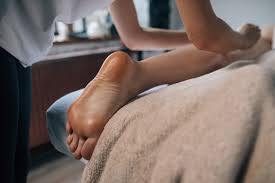 Brush aside any thoughts that massage is only a feelgood way to indulge or pamper yourself!! Massage, one of the tools in the soft tissue therapists toolbox, can be a powerful modality to help you take charge of your health and wellbeing.
Brush aside any thoughts that massage is only a feelgood way to indulge or pamper yourself!! Massage, one of the tools in the soft tissue therapists toolbox, can be a powerful modality to help you take charge of your health and wellbeing.
This article outlines three areas in which there is particularly good scientific evidence supporting the role of massage.
LIVE BETTER
1. Stress and Relaxation
Adrenaline and cortisol are both stress hormones which are released to boost your heart rate and blood sugar level. These are prehistoric reactions that were part of human survival. However, when there’s never any relief from stress, it can manifest in physical symptoms like headaches, upset stomach, elevated blood pressure, chest pain, insomnia, anger, drug and alcohol abuse, and depression to name a few.
Experts estimate that 90% or more of disease is stress-related. High levels of cortisol and adrenaline have been linked to cardiovascular disease, diabetes and cancer. Nothing ages you faster, internally and externally, than high stress. While eliminating anxiety and pressure altogether may be unrealistic, massage can, without a doubt, help manage stress.
Two things happen during a massage, stress hormones are decreased, and endorphins, the ‘feel good’ hormones, are increased. The increase in endorphins, serotonin and dopamine, results in a feeling of calm relaxation that makes chronic as well as acute stress much easier to overcome.
Stress relief alone can improve your vitality and state of mind.
By decreasing cortisol and adrenaline levels, rest and recovery can take place, potentially improving your health profile and disease risk. A regular massage programme can decrease blood pressure, which can contribute to lowering the odds of having a heart attack, kidney failure, or a stroke.
Recent studies have shown the benefit of massage to cancer patients in reducing pain and nausea associated with treatment, as well as improving emotional state.
2. Posture
The number one culprit for sore necks and backs is poor posture. When you hunch forward, be it sitting at a desk, driving a car, or computer your body is incorrectly aligned. Poor posture forces some muscles to work incredibly hard while others get weaker and shorten in length. Massage can relieve pain and loosen tight muscles, allowing your body to position itself in its
natural and pain free posture.
3. Breathing
Massage plays an important role in training the body how to relax and help improve breathing, which can be affected by high levels of stress. Respiratory issues, such as allergies, sinus problems, asthma and bronchitis, are one group of conditions that can benefit from massage therapy. Plus, when the parasympathetic nervous system responds to massage your breathing rate slows and becomes deep and regular.
GET PHYSICAL
Massage therapy has always been a cornerstone of treatment for musculoskeletal and neuromuscular conditions, postoperative recovery and sports injuries. It not only improves circulation to the area promoting repair and healing but it also flushes out toxins in the muscle that build up following injury. Massage therapy is essential to reduce pain, and scar tissue formation, as well as stretch soft tissue structures to recover good flexibility. However, you don’t have to wait for an injury to have a massage.
Massage, if received regularly, can improve athletic performance and speed recovery.
No matter your level of participation, if you exercise you can benefit from massage by improving body conditioning and preventing injury.
Studies have shown that in relation to exercise and athletic participation massage can:
- Reduce muscle tension and spasm
- Help athletes monitor muscle tone
- Promote relaxation
- Increase range of motion around a joint or within a muscle
- Improve soft tissue function
- Support recovery
- Decrease muscle stiffness and fatigue after exercise
- Reduce inflammation and swelling
- Enhance athletic performance
- Prevent injuries
Muscle injuries are more common now than they were 50 years ago, not because we’re exercising harder but because we’re more sedentary. As we age our joints tend to tighten which reduces the range of motion and flexibility of your joints. Regular massage can keep your joints fluid and less injury prone.
BOOST IMMUNITY
When the body is under a large amount of stress, the excess of stress hormones suppresses the immune system, leaving the body more vulnerable to infection and sluggish to recover. Clinical studies show that regular massage can increase the immune system’s activity level, boost lymphocytes (your white blood cells and decrease the number of T-cells, which in turn improves the body’s immune function overall.
If you want to have a chat about how you can benefit from adding massage therapy to your health and wellness regimen give us a call or send us an email to arrange a chat.
The information contained in this article is intended as general guidance and information only and should not be relied upon as a basis for planning individual medical care or as a substitute for specialist medical advice in each individual case.
